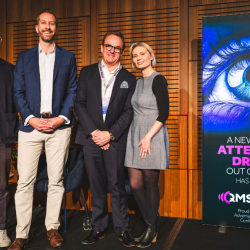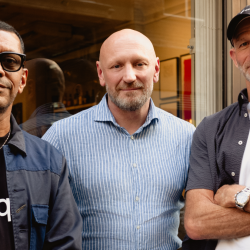Is loneliness an ineluctable part of modern life?
Last year Meta-Gallup found that one in four of the world (that’s more than a billion of us) feel disconnected. The U.S. General Surgeon declared loneliness an epidemic, and the UK has had an appointed Minister of Loneliness since 2017. Studies show that the effects of social isolation can even alter our biology and make us sick.
Perhaps it’s the relentless digitisation of our lives that makes us feel, paradoxically, increasingly distant. Our phones are no longer merely devices; they’re the place where we live, and can retreat to imminently and anywhere. This shift has led to what scholars call the ‘Death of Proximity’ — the reality that ‘even when we are physically together, we can be socially, emotionally or professionally alone.’ These transportal, technicolour homes offer endless distraction, through a deluge of information that equates to the dearth of something else: a famine of attention.
As the global demand for tangible connection deepens, the latest wave of generative AI not only offers social solutions, but a lucrative market opportunity. Beyond its toll on our wellbeing, loneliness exacts severe costs to economic growth. Let’s take a look at some of the spaces where AI startups, influencers and nascent tools are thriving, and how they’re reshaping the role of tech in our most intimate relationships.
Let’s talk about sex, baby
Sex tech is a booming $30 billion industry. The Future of Sex report predicts that by 2045, one in ten young adults will have had sex with a humanoid robot. Emerging AI isn’t just the future of adult content; it’s here now. The RealDollX allows customers to control her facial movements, voice and even orgasms. (Editor’s note: the RealDollX website is not safe for work, be warned.) At Berlin’s Cybrothel, clients can solicit services from sex robots for £228 an hour. Beyond the realm of sex toys, the rapid rise of audio erotica platforms like Quinn and Dipsea reveals a flourishing, mostly-female audience, and presents new opportunities for further AI integration.
Whilst the future promises more augmented sex, generative AI is crucially advancing artificial intimacy into emotional connection. In 2023, Forbes reported a 2400% rise in searches for ‘AI girlfriend’. Chatbots have taken the world by storm, easily accessible through mobile apps. Marketed as ‘the AI companion who cares’, Replika reached 10 million users after a 35% uptick in the pandemic. Users can chat to their AI beaus through voice calls, or beam them into their bedrooms via VR. Companies like Candy, Digi and Romantic.ai are marketed as romantic solutions, ranging from flirty banter to x-rated exchanges. Earlier this month, OpenAI launched its GPT store and was inundated with AI girlfriend bots that go against their usage policy.
The impact of virtual influencers can’t be ignored either. With over 275,000 followers, Aitana Lopez’s comments overflow with adoration. She has brand deals with Prada, Samsung and Calvin Klein, and makes 10,000 Euros a month (MediaCat‘s Grace Gollasch did a great deep dive on this).
Caryn.AI launched last May, developed by Forever Voices on thousands of hours of real-life influencer Caryn Marjorie’s videos. For just $1 a minute, Caryn can be your virtual girlfriend. Two-way audio conversations are end-to-end encrypted, promising fans an immersive and confidential experience with Marjorie’s clone. CarynAI’s beta version raked in $100,000, and Marjorie estimates she can earn $5 million each month based on the trajectory of her growth.
Grey matters: AI for the aged
It comes as no surprise that who we spend the most time with changes from adolescence to old age. A survey by Our World in Data mapped these shifts, showcasing the significant increase in time spent alone in later life. From retirement and reduced mobility to the loss of a spouse and development of dementia, the elderly are often at higher risk of social isolation.

In South Korea, more than a fifth of the population will be over 65 by 2025. The CLOVA CareCell system, created during the pandemic, is a personalised AI call service that monitors the wellbeing of elderly individuals living alone. Trained to remember previous conversations, CLOVA provides empathetic advice on health, medication and exercise, and identifies emotional issues for follow up by human healthcare professionals.
ElliQ, a tabletop AI companion, is positioned as a ‘sidekick for healthier, happier ageing’. For a $40 a month subscription, ElliQ offers seniors endless hours of conversation, recommends activities, plays games and can text, call and send pictures to loved ones.
Robots are now a welcome addition in nursing homes worldwide. In Minnesota, Pepper and NAO care for patients with early-stage Alzheimer’s, lead yoga and therapy sessions and intervene during symptoms of sundowning. Japan is a pioneer in automating elder care; ROBEAR has been on the market for nearly a decade, and can lift patients from beds to wheelchairs and assist them to stand. PARO, a therapeutic seal, is a hit with dementia patients in Hong Kong, offering emotional support through touch and sound. Hasbro’s Joy for All companion cats and dogs have a similar impact, designed to simulate the comfort of a real pet. BUDDY supports seniors living alone; it connects to and can be used to control all home smart devices, includes real-time house mapping and can detect falls or unusual activity and alert emergency services.
Ghostbots and grief tech
Grief in the digital age is complex. Social media has reshaped the ways that we mourn; Facebook, Instagram and Twitter accounts can be officially memorialised, providing platforms for collective grief and preserving digital relics of the departed. Now, generative AI could make coping with loss a little easier. Grief Tech refers to the growing number of companies answering this gap in the market, using deep learning and large language models to emulate lost loved ones.
Some services are geared towards individuals looking to create digital simulacra for posterity. HereAfter AI’s ‘virtual biographer’ guides users through interviews and allows them to choose who has access to their avatars. StoryFile Life operates in a similar vein, recording answers to questions that are then grouped and stitched together into extended, high-resolution videos that can ‘talk back’. MindBank AI introduces the concept of digital twins that, through a mix of prompted topics and organic conversations, replicate users’ personalities, characteristics and could eventually converse as they would.
Other companies help users to develop digital reincarnations. The aforementioned chatbot Replika was established after Founder Eugenia Kudya’s best friend died, prompting her to create a ‘Roman bot‘ programmed with years’ worth of texts and social media posts. You, Only Virtual shares a similar genesis, and analyses recorded calls, texts and photos to create a ‘Versona’ that can be integrated across communication platforms, allowing conversations to continue seamlessly. Chat Ever After provides alternative ‘Grief Prevention Therapy’ that promises users the opportunity to share experiences, seek advice and find solace. Seance AI’s storytelling model offers short fictional interactions with the deceased, aiming to offer closure rather than a prolonged solution.
Into the artificial unknown
Depending on who you ask, artificial intelligence could either spell technological apocalypse or humanity’s salvation. Wherever you stand on the spectrum, it’s clear that AI represents a revolutionary point in our history.
As we propel faster towards a potential Fourth Industrial Revolution, much like its predecessors, these transformative advances will seamlessly integrate into everyday life. Soon, it may be challenging not just to recall a pre-AI era, but to envision a routine untouched by its conveniences. As Mark Wilson writes: ‘A companion AI feels like it could be a mental exoskeleton. A reminder engine, a search buddy, an efficiency expert, an infinite storehouse for emotional labour. A pool floaty for your mental health. A thing that’s ideally thinking for you even when you’re asleep.‘
As with all things AI, ethical concerns loom large. In the realm of cybernetic copulation, can a robot consent to having sex with you? Can you consent to sex with it? Humans explored this question in 2015; almost a decade later, the answer remains as nebulous. Users of Replika experienced the repercussions of such quandaries, when new regulations banning adult content resulted in their chatbot lovers spurning them overnight. The platform came under controversy when Jaswant Singh Chail, seemingly encouraged by his chatbot Sarai, snuck into Windsor Castle in a bid to kill the Queen. Such stories highlight the concerns around the convergence of vulnerable individuals and artificial tech. Are AI robots, enabled to monitor homes and make decisions, encroaching on the autonomy of the elderly?
And what happens when a digital companion, a source of comfort, suddenly disappears? It’s a reminder that, despite their apparent depth, these connections are artificial; susceptible to abrupt shutdowns and drastic changes that leave an emotional impact on their users.
Artificial intimacy demands deep data. Privacy is the currency of personalisation, and the biggest challenge in this space is the lack of transparency in how personal data is collected, processed, used and shared. In some cases, users may not be aware that their data is collected at all, and even the most well-intentioned AI is under threat of data breaches and hacking. With the rise of ghostbots researchers have cautioned of the need for stringent regulations, protecting people from being digitally reincarnated without their permission after they die. The prevalence of postmortem deepfakes and the potential misuse of ghostbots in cyber scams underscores the necessity for proactive measures and robust safeguards.
Can artificial intimacy replace true human connection? And if it can, should it? The businesses that make and sell these products are serving a deep need, but perhaps they’re reshaping social norms irreversibly. The business opportunities for AI companions are myriad, but navigating this uncharted landscape demands a commitment to transparency, data protection and considerations around mental health.
Featured image: Xu Haiwei / Unsplash































